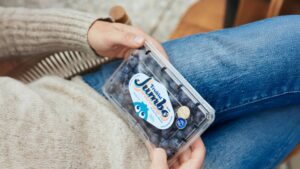Fruitist’s Explosive Growth: Revolutionizing the Berry Market
In the rapidly evolving world of food and agriculture, few stories are as compelling as that of Fruitist, a berry unicorn startup that has taken the market by storm. Over the past year, sales of Fruitist’s jumbo blueberries have tripled, contributing to the company’s remarkable achievement of surpassing $400 million in annual sales. This impressive growth is not just a result of luck; it stems from a visionary approach to quality, sustainability, and consumer trends.
A New Name and a New Era
Founded in 2012, Fruitist was originally known as Agrovision. Recently, the company announced a rebranding, fully adopting the Fruitist name for its consumer products, which also include raspberries and blackberries. This strategic move reflects their commitment to strengthen their brand identity in a competitive landscape and highlight their focus on premium fruits.
With an infusion of over $1 billion in funding from investors, including the family office of Bridgewater Associates founder Ray Dalio, Fruitist is well-positioned for future growth. There are whispers of a potential initial public offering (IPO) in 2023, drawing interest from investors and market watchers alike amid ongoing global trade tensions.
The Snackable Fruit Revolution
Fruitist’s strategy has been to tap into the booming snacking trend by positioning its berries as “snackable.” This approach aligns perfectly with the growing consumer demand for healthier snack options. While traditional snack foods like chips and pretzels have their market, many consumers are shifting toward nutritious alternatives, spurred by health movements and the adoption of GLP-1 drugs, which promote weight loss and healthy living.
Today, Fruitist’s berries are available in over 12,500 North American retail locations, including major chains like Costco, Walmart, and Whole Foods. The success of their jumbo blueberries has been especially striking, with sales skyrocketing thanks to their enhanced flavor and longer shelf life—attributes that significantly attract health-conscious consumers.
Solving ‘Berry Roulette’
At the heart of Fruitist’s mission is the desire to resolve the issue of what co-founder and CEO Steve Magami calls "berry roulette." This term refers to the inconsistent quality of berries typically found in grocery stores, which he attributes to a fractured supply chain dominated by small growers, packers, and distributors.
By vertically integrating their operations, Fruitist maintains full control over the production process from farm to table. They cultivate their berries in microclimates across Oregon, Morocco, Romania, and Mexico, utilizing machine learning to optimize harvesting times and improve quality consistency. Their investment in infrastructure, including on-site cold storage, ensures that their berries remain fresh for longer.
"We’ve built a model that allows for higher quality and extended shelf life. My berries can lasts weeks in the fridge," Magami revealed, emphasizing a commitment to quality that sets Fruitist apart from traditional produce competitors.
Future Growth and Expansions
As part of their growth strategy, Fruitist is preparing to expand their product line to include cherries, currently being cultivated in their Chilean farms, with an anticipated rollout to grocery stores by early 2026. This diversification could solidify Fruitist’s position as a leading player in the fruit market.
With over $600 million already invested in creating a year-round farming operation and a global footprint across four continents, the company is strategically planning its next steps. Although they have minimized marketing expenditures to date, this will change with their recent partnership with Major League Soccer team D.C. United, marking a significant foray into sports branding.
Navigating Market Challenges
While the prospect of an IPO generates excitement, challenges remain for Fruitist as trade tensions and tariffs impact the produce industry. High duties in some markets, such as India’s 26% tariff on blueberry imports, could pose challenges, but Magami reassures that their extensive U.S. production network mitigates potential impacts from tariffs.
"We import to provide year-round availability rather than compete with local products. Our strategy allows us to navigate these unpredictable waters," Magami explained.
Why Choose Extreme Investor Network?
At Extreme Investor Network, we go beyond the headlines to provide investors with deep insights and emerging trends. We analyze not just the success stories like Fruitist, but the underlying factors that drive growth in the food industry and other sectors. Join us for ongoing updates and discussions about innovative brands reshaping the market landscape. Stay informed, stay ahead, and make your investments count!

